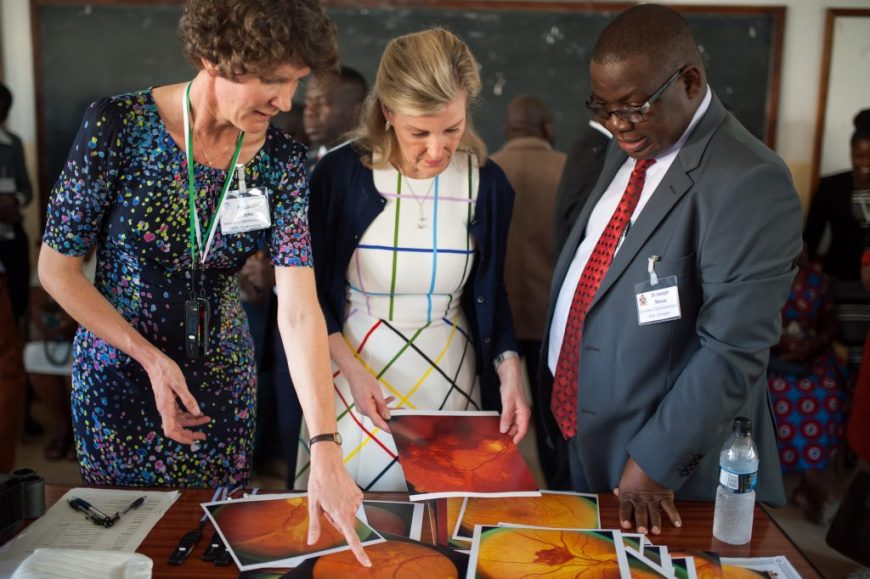Her Royal Highness The Countess of Wessex marked Commonwealth Week by visiting a hospital and school in Malawi to see activities to end avoidable blindness and champion young leaders.
The Commonwealth Eye Health Consortium programmes are funded by The Queen Elizabeth Diamond Jubilee Trust and coordinated by the International Centre for Eye Health at the London School of Hygiene & Tropical Medicine.
The Countess, who is Vice Patron of The Queen Elizabeth Diamond Jubilee Trust, visited Lilongwe’s Kamuzu Hospital to see how the Consortium is contributing to long-term capacity building for the delivery of quality eye care services.
She met with Malawian eye doctors and other health workers who have received scholarships for academic training in public health and clinical fellowships funded through the Consortium. She observed first hand a training session on screening for diabetic retinopathy being conducted by a VISION 2020 LINKS team from Fife, UK. The LINK between Lilongwe and Fife is part of the Diabetic Retinopathy Network which aims to strengthen screening and treatment in DR through developing Diabetic Retinopathy Services within LINK institutions. There are two Diabetic Retinopathy Network LINKS within Malawi supported through the Consortium. The other LINK is between Blantyre and Liverpool.
Peek is part of the Consortium and works in partnership with the School. It creates technology including apps and knowledge to empower healthcare providers to deliver quality, eye care to everyone. During the visit, the Countess tested a pupil’s vision at Mchesi Primary School with the Peek Acuity app as part of a demonstration of the Peek schools screening system to identify children with visual impairment.
She also looked at a retina (the back of the eye) using Peek Retina, a smartphone camera adapter which she first saw as a prototype during a visit to the School in 2015. Since then it has been modified and certified as a medical device and will go on general release soon.
Her Royal Highness also travelled to the Kasungu district where she saw Trust-funded activities with the Malawian Ministry of Health and the International Coalition for Trachoma Control to eliminate blinding trachoma. The Countess’ visit comes at an exciting time in Malawi as the country reaches an historic milestone in its fight against blinding trachoma: from now on no one in Malawi need lose their sight from this ancient, painful infectious disease. The country is on track to meet by 2018 the World Health Organisation criteria where trachoma is no longer a public health problem and verification of elimination by 2020.
Since its launch in 2014, the Commonwealth Eye Health Consortium has sponsored four Malawian ophthalmologists to undergo clinical fellowships around the world; awarded scholarships to two Malawians to study for Masters in Public Health; supported two Malawian LINKS which are part of the Diabetic Retinopathy Network to address diabetic retinopathy through screening and treatment services including training support from the UK/Scottish partners. The Consortium is now supporting training, research and other activities involving 34 Commonwealth countries.
Professor Matthew Burton, Professor of International Eye Health and Commonwealth Eye Health Consortium Director, represented the Consortium during the Countess’s visit to Malawi.
He said: “Malawi is making great strides in its efforts to increase eye care services and tackle avoidable blindness. The scholars and fellows the Countess met today are playing a key role in leading eye-health developments in the country.
“I am delighted that the Countess is so supportive of eye health and that she was able to see how our Trust-funded programmes are working to increase capacity and bring long-term and large-scale improvements through people, knowledge and tools.”
DR-NET LINK partners Caroline Styles and Joseph Msosa review photos of diabetic retinopathy with HRH The Countess of Wessex © The Queen Elizabeth Diamond Jubilee Trust / Aurelie Marrier d’Unienville

